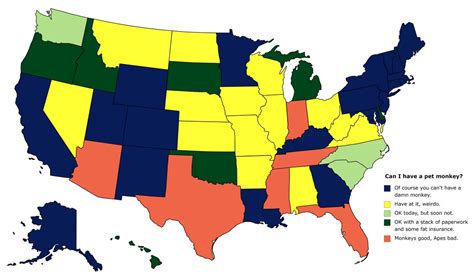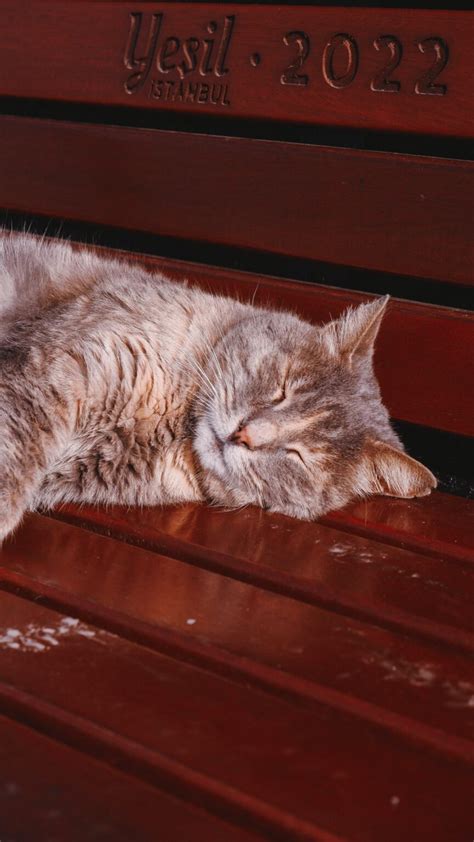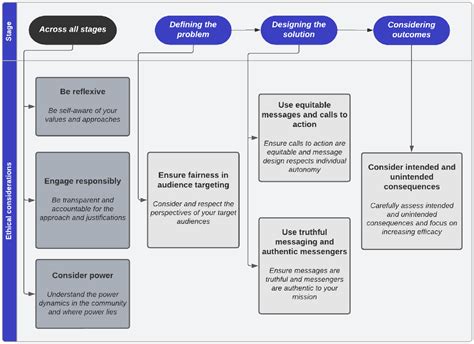Are you intrigued by the idea of having a furry friend with a playful and mischievous personality? Look no further than the enchanting world of primates! These fascinating creatures have captivated humans for centuries with their intelligence, curiosity, and ability to form deep bonds. If you've ever found yourself daydreaming about sharing your life with a charming little primate, then keep reading to discover what it takes to make this dream a reality.
Primates, an incredibly diverse group of mammals, encompass a wide range of species – from tiny pygmy marmosets to majestic gorillas. Each has its own unique set of characteristics and care requirements, so it's important to do your research before making any decisions.
One thing to consider is the legality of owning a primate as a pet. Laws regarding primate ownership vary from country to country and even from state to state, so it's crucial to familiarize yourself with the particular regulations in your area. While some places may require permits or have strict restrictions, others may prohibit primate ownership altogether.
Aside from legal considerations, it's essential to understand that primates are highly social animals that thrive in the company of their own kind. This means that if you decide to bring a primate into your home, you'll need to dedicate ample time and effort to provide them with mental stimulation, social interaction, and a suitable living environment.
Legal Considerations: Can You Legally Have a Pet Primate?

When it comes to the idea of having a pet monkey, it is important to understand the legal considerations surrounding this desire. Before embarking on the journey of owning a primate, it is crucial to be aware of the regulations and restrictions put in place to ensure the welfare and safety of both the animal and the public.
Government Regulations:
Various countries and states have specific laws and regulations regarding the ownership of primates as pets. These laws aim to prevent the illegal trade of exotic animals, protect endangered species, and ensure the well-being of animals in captivity. It is essential to thoroughly research the legal requirements in your area before even considering bringing a pet primate into your home.
Licensing and Permits:
In many jurisdictions, obtaining a license or permit is mandatory for owning a pet primate. These licenses often include strict guidelines for the housing, care, and enrichment of the animal. Additionally, they help authorities keep track of primate ownership and ensure that individuals are complying with the necessary regulations. Failure to obtain the appropriate permits can result in fines, confiscation of the animal, and legal consequences.
Primate Species and CITES:
The Convention on International Trade in Endangered Species of Wild Fauna and Flora (CITES) governs the international trade of endangered animals, including certain primate species. It is crucial to understand which primate species are protected and to ensure that any prospective purchase complies with CITES regulations. These regulations are in place to prevent the exploitation and endangerment of vulnerable primate populations.
Health and Safety Concerns:
Aside from legal considerations, owning a pet primate also comes with health and safety concerns. Primates may carry zoonotic diseases that can be transmitted to humans, which poses a risk to both the owner and the general public. Additionally, primates have specific dietary and social needs that can be challenging to meet in a domestic setting. It is essential to research and understand the potential risks and requirements before adopting a primate as a pet.
In conclusion, while the idea of having a pet primate may be intriguing, it is crucial to navigate the legal landscape surrounding this desire. By understanding the regulations, obtaining the necessary permits, and considering the health and safety concerns, one can make an informed decision that prioritizes the well-being of both the animal and the owner.
Monkey Species: Suitable Choices for Keeping as Companions
When considering the various options available for those longing to share their lives with a primate companion, it is essential to understand which monkey species are best suited for domestication. Careful selection ensures not only the animal's welfare, but also the owner's ability to meet the unique needs and demands of their chosen primate. In this section, we will explore some species that exhibit qualities and temperaments commonly perceived as suitable for domestic companionship.
| Species | Traits | Considerations |
|---|---|---|
| Capuchin Monkey | Clever, trainable, and sociable | Highly active, requiring mental stimulation and frequent social interaction |
| Marmoset | Small in size, affectionate, and adaptable to various environments | Require specialized diets, frequent veterinary care, and socialization |
| Tamarin | Intelligent, curious, and playful | Need large enclosures with plenty of climbing opportunities |
| Squirrel Monkey | Active, agile, and easily trainable | Require a significant commitment of time, space, and mental stimulation |
It is important to note that keeping a monkey as a pet is a serious undertaking that requires comprehensive knowledge and commitment. Before bringing a primate into your home, thorough research and consultation with experts, including veterinarians and experienced primate owners, is crucial. Understanding the unique needs and characteristics of each species will help ensure a compatible and rewarding relationship between owner and primate companion.
Habitat Requirements: Creating a Safe and Comfortable Environment for Your Primate Companion

Ensuring that your primate companion has a suitable habitat is essential for their overall well-being and happiness. Creating a safe and comfortable environment requires careful consideration of various factors to meet the unique needs of these intelligent and active animals.
Space: Providing ample space is crucial for your monkey's physical and mental stimulation. Different species have varying space requirements, but a general rule of thumb is that the larger the enclosure, the better. Monkeys need enough room to climb, swing, and explore, resembling their natural habitat as closely as possible. Consider including branches, ropes, and platforms to mimic trees and provide vertical space.
Security: Monkey enclosures must be secure to prevent escapes, which can be dangerous for both the animal and the surrounding community. Ensure that the enclosure has sturdy walls and a reinforced roof to prevent unauthorized access or predator intrusion. Regular inspections and necessary repairs should be carried out to maintain the security of the habitat.
Enrichment: Monkeys are highly intelligent and curious creatures that require mental and physical stimulation to thrive. Enrichment activities, such as puzzle toys, foraging opportunities, and interactive play, help prevent boredom and promote natural behaviors. Regularly rotate and introduce new toys and stimuli to keep your primate companion engaged and stimulated.
Temperature and Lighting: Creating the right climate and lighting conditions is crucial for your monkey's health. Research the specific needs of your primate species regarding temperature, humidity, and lighting requirements. Providing appropriate heating, ventilation, and lighting systems will help replicate their natural habitat and keep them comfortable.
Hygiene: Regular cleaning and maintenance of the habitat are essential to prevent the buildup of bacteria and ensure a hygienic living space for your monkey. Establish a cleaning routine for the enclosure, including disinfecting surfaces, removing waste, and regularly replacing bedding materials. Clean water and food bowls daily to prevent contamination.
Privacy: Like humans, monkeys also need privacy and quiet spaces to retreat to when they feel stressed or overwhelmed. Providing areas within the habitat where your primate companion can hide or rest undisturbed is crucial for their mental well-being. Incorporate cozy and enclosed spaces or create separate sleeping areas within the enclosure.
By carefully considering and implementing these habitat requirements, you can create a safe and comfortable environment that promotes the overall well-being of your primate companion. Remember to research the specific needs of your chosen primate species and consult with experts to ensure you are providing the best possible care for your unique furry friend.
Diet and Nutrition: What do Monkeys Consume?
When it comes to maintaining the overall health and well-being of pet monkeys, diet and nutrition play a crucial role. The dietary needs of monkeys vary based on their species, size, and age. It is essential for owners to have a comprehensive understanding of what their furry companions should consume to ensure a balanced and nutritious diet.
1. Fresh Fruits and Vegetables:
Similar to humans, monkeys benefit greatly from consuming a variety of fresh fruits and vegetables. These provide essential vitamins, minerals, and antioxidants to support their immune system and overall health. Some suitable choices include apples, bananas, oranges, leafy greens, carrots, and bell peppers.
2. Protein-Rich Foods:
Protein is a vital component of a monkey's diet as it helps in muscle development and repair. Appropriate protein sources for monkeys include nuts, seeds, legumes, and tofu. Additionally, small amounts of cooked lean meats such as chicken or fish can be added to their diet to provide essential amino acids.
3. Grains and Starchy Foods:
Monkeys can also consume grains and starchy foods to fulfill their energy requirements. Brown rice, whole wheat bread, oats, and sweet potatoes are excellent options that can be included in their diet. These foods provide a good amount of carbohydrates, which are necessary for their active lifestyle.
4. Limited Treats:
While treats can be given occasionally, it is crucial to ensure that they do not constitute a significant portion of a monkey's diet. Small amounts of healthy treats such as dried fruits, unsalted nuts, or yogurt drops can be offered as rewards or for training purposes. However, it is essential to avoid giving them sugary or high-fat treats, as these can lead to obesity and other health issues.
5. Fresh Water:
Along with a well-balanced diet, fresh and clean water should always be readily available to pet monkeys. Hydration is crucial for their overall health and prevents issues related to digestion and kidney function. It is important to ensure that their water source is regularly replenished and free from any contaminants.
Understanding and meeting the nutritional needs of pet monkeys is essential for their growth, development, and overall health. Consulting with a veterinarian who specializes in primates can provide valuable guidance specific to the species and individual requirements of your monkey.
Socialization and Training: The Importance of Positive Interaction

When it comes to welcoming a new member into your household, building a strong bond and fostering positive relationships are essential. This holds true not only for human-to-human interactions but also for human-to-animal interactions. For individuals aspiring to share their lives with an exotic companion such as a monkey, socialization and training play a crucial role in ensuring a harmonious coexistence.
Creating a conducive environment that encourages positive interaction is key to establishing a healthy relationship with your monkey. Socialization helps monkeys develop crucial skills in communication, adaptability, and behavior management. By introducing them to a variety of experiences, people, and settings, you are exposing them to the diverse elements they would encounter in their natural habitat. This exposure nurtures their ability to cope with new situations, reducing stress levels and enabling them to respond appropriately.
Positive interaction is critical in reinforcing desired behavior and correcting undesirable patterns. Training your monkey through positive reinforcement techniques such as rewards and praise will help them understand boundaries and expectations. By focusing on encouraging good behavior rather than punishing undesirable actions, you are more likely to create a trusting relationship with your primate companion.
It is important to note that socialization and training should be a continuous effort throughout your monkey's life. Consistency in establishing routines and maintaining clear communication is vital for their well-being and the prevention of certain behavioral issues. Providing mental and physical stimulation through play and engaging activities will help enrich their lives and contribute to their overall happiness.
Remember, a well-socialized and trained monkey is more likely to adapt to new situations, be comfortable around different individuals, and actively participate in their environment. By investing time and effort in socialization and training, you are fostering a deep connection that will enrich not only your monkey's life but also yours.
Health Care: Common Health Issues and Veterinary Care for Monkeys
Ensuring the well-being of your primate companion requires a thorough understanding of common health issues that can affect monkeys and the appropriate veterinary care they may need. Being aware of these aspects is crucial in providing optimal care and promoting the overall health of your monkey.
1. Zoonotic Diseases:
- Awareness of zoonotic diseases, which are illnesses that can be transmitted between animals and humans, is vital when owning a monkey. Regular check-ups and vaccinations are essential to prevent the spread of diseases such as tuberculosis, herpes B virus, and Simian Immunodeficiency Virus (SIV).
- Practicing good hygiene, including regular handwashing and proper waste disposal, can significantly reduce the risk of zoonotic infections for both you and your monkey.
2. Nutritional Needs:
- Monkeys have specific dietary requirements that must be met to ensure their well-being. A well-balanced diet consisting of fresh fruits, vegetables, protein sources, and specialized primate feed is crucial.
- Consulting with a veterinarian experienced in primate nutrition is recommended to ensure your monkey receives the necessary vitamins, minerals, and other essential nutrients.
3. Dental Care:
- Regular dental care is essential for monkeys to prevent dental diseases such as periodontal disease and tooth decay. Providing appropriate chew toys and regular dental check-ups are necessary steps in maintaining their dental health.
- Ensuring your monkey's diet includes foods that promote good dental health, such as fibrous fruits and vegetables, can also contribute to maintaining strong teeth and gums.
4. Social and Environmental Enrichment:
- Monkeys are highly social animals and require mental stimulation and environmental enrichment to thrive. Lack of stimulation can lead to behavioral issues and poor mental health.
- Providing a suitable living environment with plenty of space, climbing structures, and opportunities for social interaction with other monkeys or appropriate substitutes is crucial for their well-being.
5. Regular Veterinary Check-ups:
- Scheduling regular veterinary check-ups is key to monitor your monkey's overall health and detect any potential issues early on. A skilled veterinarian experienced in primate care can conduct thorough examinations and provide appropriate treatments if necessary.
- Additionally, veterinary check-ups offer an opportunity to discuss any concerns or questions you may have regarding the health and well-being of your monkey.
By understanding the common health issues that can affect monkeys and providing them with proper veterinary care, you can ensure a healthy and fulfilling life for your primate companion.
Expenses: The Cost of Having a Pet Primate

When it comes to welcoming a primate into your home, there are several financial aspects to consider. From food and housing to medical expenses and enrichment toys, owning a pet monkey can be quite expensive.
- Food: Providing a balanced and nutritious diet for your pet monkey is crucial for its overall health. Depending on the species, monkeys have specific dietary requirements that may include a combination of fruits, vegetables, nuts, and specially formulated primate pellets. The cost of food can vary depending on the size and dietary needs of your monkey.
- Housing: Monkeys require adequate space to move, climb, and play. A spacious and secure enclosure or habitat is necessary to ensure the well-being of your pet. Constructing or purchasing a suitable living space for your monkey can be a significant investment.
- Medical Care: Regular veterinary check-ups and vaccinations are essential for the health and longevity of your pet monkey. Additionally, monkeys can be prone to certain illnesses or diseases that might require specialized treatments or medications. It is crucial to factor in the cost of routine medical care and potential emergencies.
- Enrichment: Providing mental and physical stimulation is vital to prevent boredom and ensure the well-being of your pet monkey. Enrichment tools, such as puzzles, toys, and climbing structures, can help simulate the natural environment and behavior of monkeys. Investing in various enrichment items will not only keep your monkey entertained but also promote its overall happiness.
- Training and Socialization: Monkeys are highly intelligent animals that require proper training and socialization to live harmoniously with their human caregivers and other pets. Enrolling your monkey in training classes or hiring a professional trainer may be necessary to ensure a well-behaved and sociable pet.
- Legal Requirements: Depending on your location, there may be legal regulations and permits required for owning a pet monkey. It is essential to research and comply with any necessary legal obligations to avoid potential fines or conflicts with local authorities.
Considering the various expenses associated with owning a pet monkey, it is crucial to carefully evaluate your financial capabilities and commitment to providing a fulfilling and suitable environment for these unique creatures.
Longevity and Commitment: Understanding the Lifespan and Care Requirements
Exploring the topic of how to care for and ensure the well-being of a pet monkey involves considering two crucial aspects - longevity and commitment. To provide the best possible life for a primate companion, it is essential to gain a comprehensive understanding of their lifespan and the care requirements associated with them.
When it comes to longevity, it is important to note that pet monkeys, like many other animals, can live a long life. The lifespan of a monkey can vary depending on the species, but it is not uncommon for some primates to live for several decades. This means that bringing a monkey into your life requires a long-term commitment and diligent care for their well-being throughout their entire lifespan.
Properly caring for a pet monkey involves a range of considerations. These include providing a balanced and nutritious diet, ensuring regular veterinary check-ups, and creating an enriching and stimulating environment. Daily interaction, mental stimulation, and physical exercise are also paramount for the well-being of a pet monkey. It is crucial to understand that monkeys are highly social animals and thrive in an environment where they can engage in social interactions, both with humans and other compatible monkey companions.
Moreover, owning a pet monkey also requires a significant commitment of time, energy, and financial resources. Monkeys demand a great deal of attention and care, much like a human child. They need constant supervision and cannot be left alone for extended periods. In addition, the costs associated with their care, including food, housing, veterinary expenses, and the required permits or licenses, must be taken into account.
Before embarking on the adventure of owning a pet monkey, it is crucial to thoroughly research and understand the commitment involved. Being aware of the potential challenges and responsibilities assists in ensuring the well-being and happiness of both the monkey and the humans with whom they share their lives.
Ethical Considerations: The Impact of Monkey Ownership on Conservation Efforts

When considering the desire to have a pet monkey, it is crucial to fully understand the ethical implications and the potential impact on conservation efforts. By examining the relationship between monkey ownership and conservation, we can gain insight into the complex dynamics that surround this topic.
1. Conservation Status One of the key ethical considerations is the conservation status of the monkey species in question. Many monkey species are endangered or facing threats in their natural habitats due to habitat destruction, illegal wildlife trade, and other human activities. Owning a monkey as a pet may inadvertently contribute to the demand for wild-caught individuals or encourage the breeding of captive monkeys, which can have negative implications for conservation efforts. |
2. Wildlife Rehabilitation Another aspect to consider is the potential impact on wildlife rehabilitation efforts. In some cases, individuals acquire pet monkeys that were previously owned illegally or rescued from harmful situations. Supporting proper rehabilitation facilities and their efforts to reintroduce these monkeys to their natural habitats should be prioritized over keeping them as pets, as it aligns with conservation goals and gives monkeys a chance to thrive in their original environments. |
3. Animal Welfare Monkey ownership can also raise concerns about animal welfare. Primates have complex social and cognitive needs that may be difficult to meet in a domestic setting. They require specialized care, extensive social interactions, and access to natural environments. Keeping a monkey as a pet often falls short of providing these essential requirements, which can have detrimental effects on the well-being of the animal. |
4. Conservation Education Lastly, focusing on conservation education can provide an alternative approach to fulfilling the desire to interact with monkeys. Promoting conservation efforts, supporting organizations dedicated to primate conservation, and engaging in responsible ecotourism can contribute positively to the protection of monkey species and their habitats. By raising awareness about the importance of conservation, individuals can make a more significant impact on preserving these captivating creatures and their ecosystems. |
Considering the ethical considerations surrounding monkey ownership is crucial to contribute to the preservation of monkey species and their habitats. It is essential to prioritize the broader conservation efforts and explore alternative ways to engage with monkeys that align with responsible conservation practices.
FAQ
What are the legal requirements for owning a pet monkey?
Owning a pet monkey is subject to various legal requirements which vary depending on the location. In some places, it may be illegal to own a monkey as a pet without a special permit. It is crucial to research and understand the specific laws and regulations in your area before considering owning a pet monkey.
What are the potential challenges of owning a pet monkey?
Owning a pet monkey can be a significant challenge. Monkeys require a considerable amount of attention, care, and proper socialization. They have complex social structures and specific dietary and environmental needs. It is important to bear in mind that more often than not, monkeys do not make suitable pets for the average individual due to their demanding nature.
Can monkeys transmit diseases to humans?
Yes, monkeys can potentially transmit several diseases to humans. Some of these diseases include herpes B, Ebola, and tuberculosis. It is essential to take necessary precautions, such as regular veterinarian check-ups and maintaining good hygiene practices when handling a pet monkey to minimize the risk of contracting any diseases.



